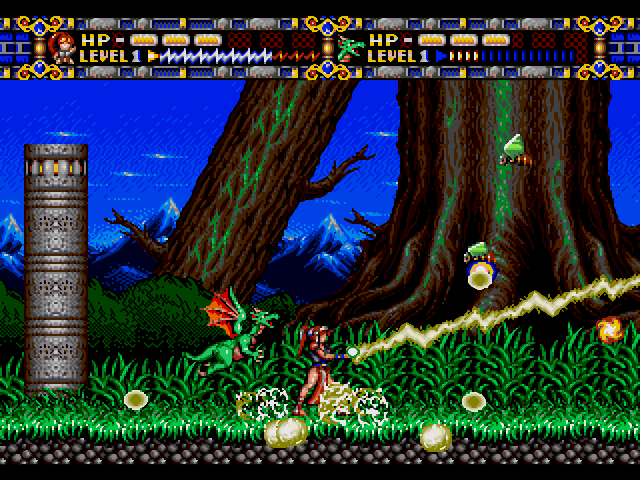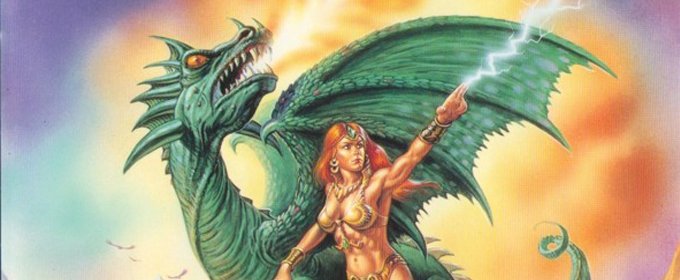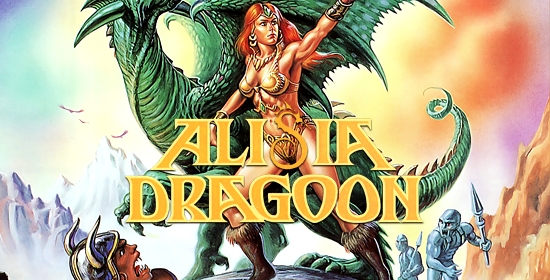The basic gameplay in Alisia Dragoon is fairly typical for the genre, run around a level jumping from platform to platform, shoot at bad guys, survive until the end. Mechanically, there's not much new here. Yet, AD advances the formula in a few key ways that have earned it much love:
- Your attack is an auto-targeting lightning attack.
- Levels are fairly large and reward exploration with powerups and loads of secret areas.
- You have an AI buddy (well actually four) that follow you around and assist.
- Light RPG elements
Reminding me of Thexder's auto-targeting laser attack in robot mode, I was not surprised to find out the same developer worked on both games. This lightning attack made me think this game would be a breeze at first: face an enemy and push fire, no targeting or strategy. But AD balances out the seemingly overwhelming power of your attack in a few really well designed ways. First, you are practically overwhelmed with enemies, which forces you to pace your progression. Second, as the game advances they simply absorb more punishment, even powering up all the way doesn't completely remedy this. Third, the more intensely you use your attack the weaker it gets (reminiscent of The Legendary Axe on the TurboGrafx-16/PC Engine from a couple years before). You have to find a space to rest for a moment to recharge your attack. The late game really requires a surprising amount of nuanced strategy to make it through and can't really be appreciated till you're there (and have found yourself at a bitter end many times to learn your lessons).
The levels in AD are varied, interesting and just large enough to get a little lost in, but not so big that you can get lost in them. You never really wonder where to go as you wander around, yet they at least pretend to offer several choices as you work your way through them. Since there's no time-limit, it's worth taking the time to explore as you'll almost always find something valuable: a power-up, food, fairy helpers, etc. They're really well designed and you never feel like the game is being cheap or cheating.
AD introduces what may be one of the earlier AI controlled allies in a game. Often called "familiars" or "companions", AD let's the player select from one of four (or even none at all) friendly helpers creatures. Each helper has their own life bar and attack level (up to 3). The helper AIs each have different kinds of attacks and use-cases, from tossing boomerangs to unleashing a devastating screen clearing lighting attack. Cultivating your AIs is an important strategy element in the game.
The companions are interesting, and building them up and keeping them alive is definitely an interesting part of the game -- and they can be helpful. But I also kept wishing for them to be a little more...aggressive. There were plenty of times that I was being mercilessly beat upon only to have my dragon or ball of fire or whatever simply sit there and not do much of anything as I yelled at the screen "some friend you are!" Even with everybody all powered up, you never really reach the kind of havoc you wish you could unleash on the enemy. So they're really more of an enhancement than a core game-play mechanic. They're optional enough that I'm sure there's a group of AD players that simply turns the familiar off for a more hard-core game-play experience.
Graphics in Alisia Dragoon are generally very good. You'll see interesting characters in fascinating settings. The range from fantasy to techno alien. However, they have a flavor to them that's like nothing else on the system. I think that's because Game Arts really cut their teeth in the computer games market as well as most of the design work and graphics done by anime studio, Gainax, better known for computer dating sims when they do work on games.
 It's almost like AD looks like a very good guess of what a computer games company thinks arcade style graphics on a console look like. It's like having a world class classically trained portrait painter draw a picture of Mario. It'll be beautiful, accurate, have sophisticated brush technique and treatment of lighting, but it won't really be the cartoon Mario everybody's used to seeing. In the same sense, the character designs in AD seem almost overworked and scream for a higher resolution screen to capture it all - they would definitely be more at home on a Japanese computer.
It's almost like AD looks like a very good guess of what a computer games company thinks arcade style graphics on a console look like. It's like having a world class classically trained portrait painter draw a picture of Mario. It'll be beautiful, accurate, have sophisticated brush technique and treatment of lighting, but it won't really be the cartoon Mario everybody's used to seeing. In the same sense, the character designs in AD seem almost overworked and scream for a higher resolution screen to capture it all - they would definitely be more at home on a Japanese computer.I'd rate the music in Alisia Dragoon a tad higher than the graphics. There's some really great music in the game. Stretching from Baroque harpsichord music to upbeat new age rock the music services and enhances each level well. The Genesis sound chip is bent in some pretty great ways to provide subtle reverb and echo effects, drum machine, orchestrations and organ leads that really sound fantastic. Sound effects are likewise well designed and get out of the way. You main attack sound never gets annoying, and various clumps, bumps and explosions are sound about as good as you'd expect. A few of the sound effects, namely an enemy teleportation effect, are simply awesome and really caught my attention the first couple times I'd heard it.
Gameplay in Alisia Dragoon is interesting. I kept finding I wanted to compare it to something else. And I think this is one of the reasons the game never really broke out on its own. For me the main game that kept coming up in my thoughts was Castlevania.
For many years Sega sought to produce a Castlevania clone for their systems. Master of Darkness for the Sega Master System is one early attempt. But none of them really quite caught the Konami magic. Despite different gameplay mechanics, the great music and fantasy setting really kept bringing me back to that conclusion however. A real Castlevania game wasn't to hit the system until two years later.
There's really not much else to say about Alisia Dragoon. It's an unbelievably solid and polished game, well worth playing. But it probably won't drive you histrionic with unbelievable levels of fandom. You'll be rewarded with about an hour long playthrough, some great music, some cool locations and interesting gameplay. If you beat it, you'll be rewarded with a pretty cool ending and one of the better songs in the soundtrack. It's kind of sad that AD doesn't have a bigger legacy. It's not even a virtual console game. Game Arts these days is too busy printing money with its Lunar games to really try and revive a pretty great game.
Further Reading





No comments:
Post a Comment